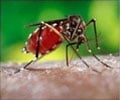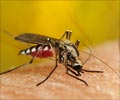What is Dengue?
Dengue is an infectious disease caused by the dengue virus, which is mosquito-borne and is mainly found in the tropical regions. Dengue's dreaded complication is hemorrhage (profuse bleeding) due to low platelet count. There are no known medical therapies to increase the platelet count except for platelet transfusion. However, a few natural remedies are helpful in improving the platelet count. Though this is not a foolproof method, it can help in some cases and does no harm to the patient in any way.
Dengue can be a serious infection especially among children, which means about two-fifths of the world's population, is at risk. Dengue and dengue hemorrhagic fever are spread from human-to-human by the bite of mosquitoes carrying the dengue virus.
Symptoms of Dengue: The major symptoms of dengue include fever, headache, muscle and joint pain and a typical skin rash that occurs all over the body, similar to measles.
Complications of Dengue Fever: Some very rare cases of dengue may develop into a more life threatening form known as dengue hemorrhagic fever, which results in bleeding, decreased blood platelet count, blood plasma leakage or the more fatal dengue shock syndrome, which causes dangerously low blood pressure.
Dengue and Low Platelet Count
Dengue is characteristically associated with a decrease in platelet count. The reduction in the count occurs at about three days from the on-set of fever. When the virus through the mosquito bite infects a person, the virus tends to bind to the white blood cells and then enters them. After this, they start reproducing inside the cells and do so while circulating throughout the body. Due to the body's immune response, the white blood cells produce signaling proteins such as cytokines and interferons, which cause various symptoms such as fever and severe body pain associated with dengue. In case of severe infection, the viral reproduction rate is increased manifold and vital organs such as liver and bone marrow are affected. Capillary permeability is increased in the small blood vessels, as a result, the fluid tends to leak through the vessel walls and into the body cavity. Less blood circulates in the vessel and the blood pressure drops very low. Furthermore, the infection of the bone marrow results in low platelet count, which leads to the risk of relentless bleeding, as platelets help in clotting of the blood during injuries.
How to Increase Platelet Count Naturally?
The drop in platelet count can be tackled with many natural foods that are easily available. Following are few points that help in understanding how to increase platelet count:
- Papaya leaves have recently entered the dengue treatment process arena due to their high complex protein content and their ability to help the bone marrow increase the production of platelets. According to several studies, papaya leaves have been proven highly beneficial in treating dengue and increasing platelet count. The best way is to crush three fresh leaves without adding any fibrous parts of it to make a glass of juice and consume it as two tablespoons every six hours in a day.
- Anti-oxidants that are present in food tend to neutralize the free radicals and thus help cope with the decrease in platelet count. Berries such as strawberries, blueberries etc., are found to be rich in anti-oxidants and consuming them in good quantities may help in increasing platelet count.

- Fruits and Vegetables: Fresh fruits and vegetables, that are organic in nature, contain loads of micronutrients such as vitamins, especially vitamin K that plays an important role in blood clotting, minerals etc. These are found to be very essential for humans. Green leafy vegetables, dark green vegetables such as lettuce and parsley, olive, soy bean, kale, broccoli, cauliflower, cabbages, tomatoes etc., are proven to help increase the platelet levels. Orange and its juice known for its folate content, is also said to improve platelet count. Many people believe that the exotic kiwi fruit from New Zealand helps increase platelet count in the body during dengue fever.
- Omega 3 Fatty Acids: Foods such as fish, flax seed, walnut, spinach etc., are few examples of omega-3 fatty acids rich foods. Omega-3 fatty acid boosts the immune system and can naturally increase the platelet level count. Hence consuming them can help cope with the low platelet levels.

- Refrain from Processed Foods, Sugars: Also it is important to stay away from specific unhealthy foods such as processed food, refined sugars, junk food, alcohol and caffeinated beverages. Intake of these foods and drinks can cause the platelet count to drop even further because these foods may hamper the production of platelets.
- Get Plenty of Rest: It is important to get plenty of rest and relaxed sleep when affected with any kind of disease. The much needed rest can help the body recharge and produce more platelets. It is also advised to drink plenty of water.
- Vegetable Juices: Aloe vera juice, beetroot juice and carrot juice are believed to help improve the platelet count. Aloe vera juice should be taken after every meal, which is believed to be ideal. Taking 2 or 3 tablespoons of beetroot juice mixed with carrot juice twice a day can boost the platelet count in just a few days.

Prevention of Dengue
Many species of mosquito under the genus Aedes transmit dengue, especially the Aedes aegypti species is involved in spreading the infection and is considered as the main cause of dengue. This species of mosquito breeds in stagnant water and usually bites during daylight hours. The virus circulates in the blood for 2-7 days after the human is affected, during which the mosquito may acquire the virus by biting the infected human and infect another unsuspecting victim.
There are a number of ways to prevent the occurrence of dengue. The best way is to clear stagnant water in and around the house, which will prevent mosquito breeding. It is better to clear water from buckets, tanks, pots etc. Also it is better to store water in a covered container. Use of mosquito nets and repellent creams, coils etc., can help in reducing mosquito bites.







